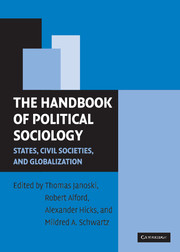Book contents
- Frontmatter
- Contents
- Preface
- Contributors
- Political Sociology in the New Millenium
- PART I THEORIES OF POLITICAL SOCIOLOGY
- PART II CIVIL SOCIETY: THE ROOTS AND PROCESSES OF POLITICAL ACTION
- 10 Money, Participation, and Votes
- 11 Public Opinion, Political Attitudes, and Ideology
- 12 Nationalism in Comparative Perspective
- 13 Political Parties
- 14 Organized Interest Groups and Policy Networks
- 15 Corporate Control, Interfirm Relations, and Corporate Power
- 16 Social Movements and Social Change
- 17 Toward a Political Sociology of the News Media
- PART III THE STATE AND ITS MANIFESTATIONS
- PART IV STATE POLICY AND INNOVATIONS
- PART V GLOBALIZATION AND POLITICAL SOCIOLOGY
- References
- Name Index
- Subject Index
15 - Corporate Control, Interfirm Relations, and Corporate Power
Published online by Cambridge University Press: 05 June 2012
- Frontmatter
- Contents
- Preface
- Contributors
- Political Sociology in the New Millenium
- PART I THEORIES OF POLITICAL SOCIOLOGY
- PART II CIVIL SOCIETY: THE ROOTS AND PROCESSES OF POLITICAL ACTION
- 10 Money, Participation, and Votes
- 11 Public Opinion, Political Attitudes, and Ideology
- 12 Nationalism in Comparative Perspective
- 13 Political Parties
- 14 Organized Interest Groups and Policy Networks
- 15 Corporate Control, Interfirm Relations, and Corporate Power
- 16 Social Movements and Social Change
- 17 Toward a Political Sociology of the News Media
- PART III THE STATE AND ITS MANIFESTATIONS
- PART IV STATE POLICY AND INNOVATIONS
- PART V GLOBALIZATION AND POLITICAL SOCIOLOGY
- References
- Name Index
- Subject Index
Summary
In a democracy, citizens possess an array of rights and privileges. Among these benefits is that all citizens are viewed as equal in the eyes of the law. No one is intrinsically endowed with a disproportionate set of political privileges. All citizens have a right to pursue their political objectives, as long as they do so in a legally sanctioned manner.
Although all citizens in a democracy have formal political equality, some are able to exercise more power than others. Sometimes this occurs within the confines of normal political action, when one group develops a position that garners widespread support. In other situations, some actors may have resources that provide them with an advantage independent of the quality of their ideas.
No observer of modern democratic societies denies that some political actors have significantly more power than others. The issue is how this power is distributed, both the extent to which it is concentrated among a relatively small group and the extent to which the structure is malleable. For several decades, beginning in the 1950s, social scientists engaged in a vigorous debate about the level of political inequality and its effect on the functioning of democracy. This debate began to lose steam in the early 1990s. By the turn of the twenty-first century, few sociologists or political scientists were writing on the topic.
Despite the apparent decline in attention given to the concentration of power, there seems to be no reason to doubt its relevance.
- Type
- Chapter
- Information
- The Handbook of Political SociologyStates, Civil Societies, and Globalization, pp. 310 - 330Publisher: Cambridge University PressPrint publication year: 2003
- 5
- Cited by

